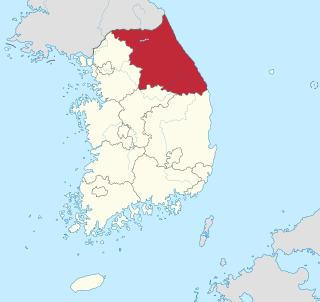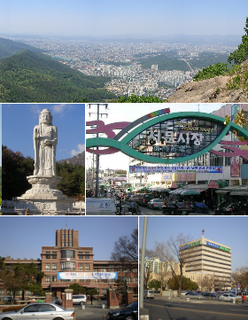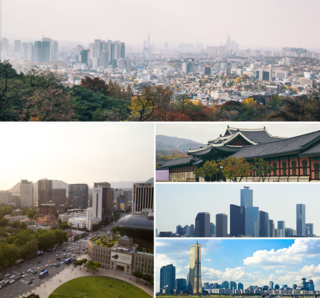
South Korea, officially the Republic of Korea is a country in East Asia, constituting the southern part of the Korean Peninsula and sharing a land border with North Korea.

Busan, formerly romanized as Pusan and now officially Busan Metropolitan City, is South Korea's second most-populous city after Seoul, with a population of over 3.5 million inhabitants. It is the economic, cultural and educational center of southeastern South Korea, with its port—Korea's busiest and the fifth-busiest in the world —only about 190 kilometers (120 mi) from the Japanese islands of Kyushu and Honshu. The surrounding "Southeast Economic Zone" is South Korea's largest industrial area.

Gangwon-do is a province of South Korea, with its capital at Chuncheon. It is bounded on the east part by the East Sea, and borders Gyeonggi Province to its west, and North Gyeongsang Province and North Chungcheong Province to its south. Its northern boundary is the Military Demarcation Line, separating it from North Korea's Kangwŏn Province. Before the division of Korea in 1945 Gangwon and Kangwŏn formed a single province. Pyeongchang County hosted the 2018 Winter Olympics and 2018 Winter Paralympics. Gangwon will host the 2024 Winter Youth Olympics.

North Jeolla Province, also known as Jeonbuk, is a province of South Korea. North Jeolla has a population of 1,869,711 (2015) and has a geographic area of 8,067 km2 located in the Honam region in the southwest of the Korean Peninsula. North Jeolla borders the provinces of South Jeolla to the south, North Gyeongsang and South Gyeongsang to the east, North Chungcheong to the northeast, and South Chungcheong to the north.

Gyeonggi Province is the most populous province in South Korea. Its name, Gyeonggi, means "the area surrounding the capital". Thus Gyeonggi-do can be translated as "province surrounding Seoul". The provincial capital is Suwon. Seoul—South Korea's largest city and national capital—is in the heart of the province but has been separately administered as a provincial-level special city since 1946. Incheon—South Korea's third-largest city—is on the coast of the province and has been similarly administered as a provincial-level metropolitan city since 1981. The three jurisdictions are collectively referred to as Sudogwon and cover 11,730 km2 (4,530 sq mi), with a combined population of 25.5 million—amounting to over half of the entire population of South Korea.

Ulsan, officially the Ulsan Metropolitan City, is South Korea's seventh-largest metropolitan city and the eighth-largest city overall, with a population of over 1.1 million inhabitants. It is located in the south-east of the country, neighboring Busan to the south and facing Gyeongju to the north.

Daegu, formerly spelled Taegu and officially known as the Daegu Metropolitan City, is a city in South Korea, the fourth-largest after Seoul, Busan, and Incheon, and the third-largest metropolitan area in the nation with over 2.5 million residents. Daegu and surrounding North Gyeongsang Province are often referred to as Daegu-Gyeongbuk, with a total population over 5 million.

Iksan is a city and major railway junction in North Jeolla Province, South Korea.

Wonju is the most populous city in Gangwon province, South Korea.

A National Treasure is a tangible treasure, artifact, site, or building which is recognized by the South Korean government as having exceptional artistic, cultural and historical value to the country. The title is one of the eight State-designated heritage classifications assigned by the administrator of the Cultural Heritage Administration (CHA) in accordance with the Cultural Heritage Protection Act after deliberation by the Cultural Heritage Committee.

Ewha Womans University is a private women's university in Seoul, South Korea founded in 1886 by Mary F. Scranton under Emperor Gojong. It is currently the world's largest female educational institute and is one of the most prestigious universities in South Korea.

Tourism in South Korea refers to the tourist industry in the Republic of Korea. In 2012, 11.1 million foreign tourists visited South Korea, making it the 20th most visited country in the world, and the 6th most visited in Asia. Most non-Korean tourists come from other parts of East Asia such as Japan, China, Taiwan, and Hong Kong. The recent popularity of Korean popular culture, often known as the "Korean Wave", in these countries has increased tourist arrivals. Seoul is the principal tourist destination for visitors; popular tourist destinations outside of Seoul include Seorak-san national park, the historic city of Gyeongju and subtropical Jeju Island. Traveling to North Korea is not normally possible without a special permission, but in recent years organized group tours have allowed groups of South Korean citizens to visit Mount Kumgang.

The National Museum of Korea is the flagship museum of Korean history and art in South Korea and is the cultural organization that represents Korea. Since its establishment in 1945, the museum has been committed to various studies and research activities in the fields of archaeology, history, and art, continuously developing a variety of exhibitions and education programs.

Jung District is one of the 25 districts of Seoul, South Korea.

The Department of Asia in the British Museum holds one of the largest collections of historical objects from Asia. These collections comprise over 75,000 objects covering the material culture of the Asian continent, and dating from the Neolithic age up to the present day.
The Han Sang Soo Embroidery Museum is an art museum specializing in Korean embroidery located in Gahoe-dong, Jongno-gu, central of Seoul, South Korea. It was established by Han Sang Soo, who holds a title as a jasujang, a profession recognized as an Important Intangible Cultural Property by the Cultural Heritage Administration of South Korea.
Sillim or Sillim-dong is a statutory division of Gwanak District, Seoul, South Korea. Seoul National University and Nokdu Street are located in the town. Its name means "new forest", which was derived from the woods outstretched from Mt. Gwanak. It consists 11 administrative neighbourhoods.

Seoul, officially the Seoul Special City, is the capital and largest metropolis of South Korea. Seoul forms the heart of the Seoul Capital Area. Ranked as an alpha world city, Seoul was the world's 4th largest metropolitan economy with a GDP of US$635 billion in 2014 after Tokyo, New York City and Los Angeles. International visitors generally reach Seoul via AREX from the Incheon International Airport, notable for having been rated the best airport for nine consecutive years (2005–2013) by the Airports Council International. In 2015, it was rated Asia's most livable city with the second highest quality of life globally by Arcadis, with the GDP per capita (PPP) in Seoul being around $40,000. In 2017, the cost of living in Seoul was ranked 6th globally. In 2018, Seoul's real estate market was ranked 5th in the world for the price of apartments in the downtown center., Seoul was one of the host cities for the official tournament of the 2002 FIFA World Cup in Korea/Japan.
The 1991 World Table Tennis Championships were held in Chiba from April 24 to May 6, 1991.
















